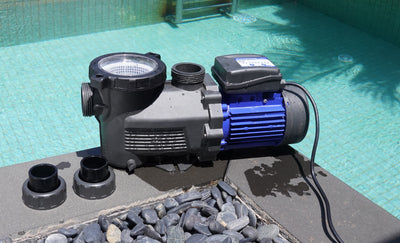How Long Should I Run My Pool Pump Every Day?
Maintaining the right circulation in your pool is crucial for keeping it clean, clear, and free from algae and debris. One of the key components in achieving proper water circulation is your pool pump. However, many pool owners find themselves asking, "How long should I run my pool pump every day?"
The answer may seem simple, but there are several factors to consider, such as your pump's type, energy consumption, and your pool’s needs. In this guide, we’ll cover everything you need to know to optimize your pool pump's run time, improve efficiency, and reduce energy costs.
The Role of a Pool Pump
A pool pump is vital for your pool’s filtration system. It keeps the water circulating, ensuring it flows through the filter, which traps debris and contaminants. Without proper circulation, your pool water would quickly become stagnant, inviting algae growth and debris buildup.
The pool pump’s function is simple: pull water in, push it out through the filter, and then return clean water to your pool. For this to happen, the pump needs to circulate the entire volume of water in the pool at least once per day, which is called the turnover rate.
How to Calculate Turnover Rate
To determine how long your pump should run each day, you first need to know your pool’s volume. You can calculate your pool volume by measuring the pool's length, width, and depth, or by using an online pool volume calculator.
Once you have the pool volume, divide it by 8 to calculate the gallons per hour (GPH) that need to be pumped. Since most pumps are rated in gallons per minute (GPM), divide the GPH by 60 to find the GPM.
For example:
- Total Pool Volume ÷ 8 = GPH
- GPH ÷ 60 = GPM
From this calculation, you’ll know the GPM required to achieve full turnover in one 8-hour period.
Choosing the Right Pool Pump
To ensure proper circulation, your pool pump must have a flow rate that matches or exceeds your required GPM. It’s okay if the pump’s GPM is higher than needed, but a pump with a lower GPM will not be effective at turning over your pool’s water.
When selecting a pump, ensure it aligns with your pool’s size and filtration system. A pump that is too powerful for your pool’s setup can result in wasted energy, while a weak pump will struggle to circulate the water properly.
When Should You Run Your Pool Pump?
While the key is to run your pool pump for at least 8 hours each day, the timing of these hours is equally important. Running your pump during non-peak hours can significantly reduce your electricity costs.
Run During Off-Peak Hours
Electricity rates often vary throughout the day, with higher rates during peak hours. Peak hours typically occur when the grid is under more strain—such as in the late afternoon or evening, when people return home and start using more electricity.
Check with your local energy provider to identify off-peak hours in your area. Scheduling your pool pump to run during these times will help you save on electricity costs. A programmable pool timer can be a convenient tool for automating the pump's run times.
Run Your Pump After Adding Chemicals
After adding chemicals like pool shock or sanitizers, it's crucial to run the pool pump to distribute them evenly throughout the water. For pool shock, especially, it’s best to run the pump overnight to ensure the chemicals don't get burned off by the sun, thus improving their effectiveness.
Running the Pump for Non-Consecutive Hours
If you'd prefer not to run your pool pump for a full 8-hour stretch, you can divide the total runtime into shorter intervals spread throughout the day. For instance, you can run the pump for a few hours in the morning, then again in the afternoon or evening. Just ensure the total runtime adds up to at least 8 hours in a 24-hour period.
The Best Pool Pump Type
The type of pool pump you have plays a significant role in how long you should run it.
-
Horsepower: The more powerful your pool pump, the faster it can circulate water, meaning it doesn’t need to run as long. However, it’s important to ensure that the pump’s horsepower is appropriate for the size of your pool and filtration system. A pump that is too powerful for your system can waste energy, while a low-powered pump will struggle to meet the required GPM.
-
Single-Speed, Dual-Speed, or Variable-Speed Pumps: Single-speed pumps are the least efficient, running at one speed regardless of the pool’s needs. Dual-speed and variable-speed pumps are more efficient options. Variable-speed pumps, in particular, use less power and provide more flexibility, running at lower speeds to save on energy. While more expensive upfront, these pumps are more cost-effective in the long run, saving money on electricity bills and providing superior filtration.
Conclusion
The optimal runtime for your pool pump is essential for maintaining a clean, clear pool. Running it for at least 8 hours per day is necessary to achieve proper turnover. By considering factors such as electricity rates, pool pump type, and proper chemical distribution, you can run your pool pump efficiently while minimizing energy costs.
AQUASTRONG's variable-speed pool pumps are designed to help pool owners achieve optimal water circulation while saving energy. If you're looking to improve your pool’s efficiency, upgrading to a variable-speed pump is a smart investment.

